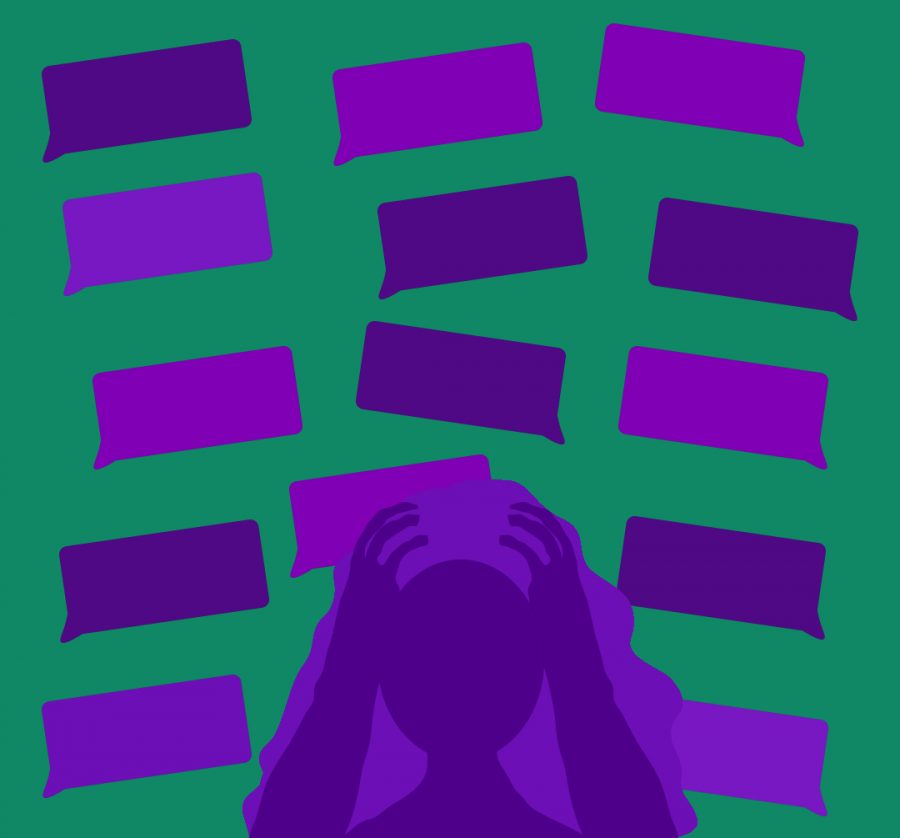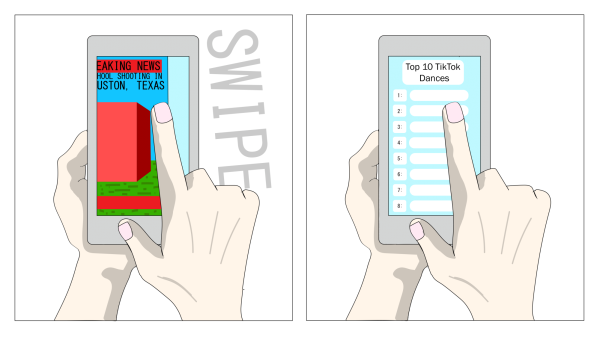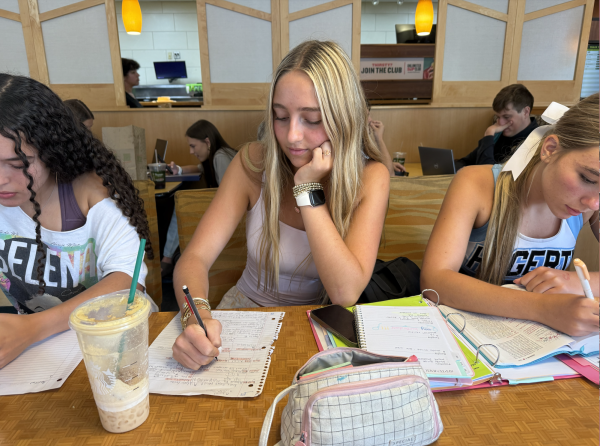To speak or not to speak
Social anxiety makes small talk and socialization a lot more difficult and complex.
photo by Gabriella Herrera
Small talk helps people with or without social phobias interact with each other and create more comfortable environments.
Should I choose the empty seat in the back, or the one in the second row? The second row is almost full, they could be waiting on a friend, and I do not want to get in anyone’s way… but will I be able to see in the back? The bell is about to ring, I have to make a choice.
At one point or another, the dreaded period arrives where students must pick where to sit or risk getting left in a group of scary strangers. But for some, this can be a lot more complicated than just “in which seat am I the least likely to get called upon.”
For students with anxiety, interacting in a social setting is a complex process due to their obsessive thought patterns. These people tend to fixate on the opinions of others and how their decisions are perceived. When every mistake feels like the end of the world, relationships and mental health begin the crumble as people lose confidence in themselves.
Small talk is an amazingly helpful tool for people who struggle with obsessive thoughts. Small talk can be an easy and fun pastime in a new environment: it breaks up the tension and allows people to feel more at ease.
It’s even an art. For those more socially adept, it is easy to maneuver out of awkward situations. Talking about the weather or what they ate for breakfast can flow naturally without even a second thought.
People with social anxiety are not helpless, and they can absolutely handle themselves when it comes to making polite conversation. If they are feeling overwhelmed and unable to handle tedious interactions, they can pull themselves out and calm themselves down, but for many, initiating conversation is very difficult, and having someone else ask them a simple question is a great relief.
For instance, sitting in a strange new class with students you have never met before can be intimidating and make you regret trying something so different, even if it is something you love. But when the senior next to you asks what video games you play, and you spend the first twenty minutes of class debating Minecraft vs Roblox, suddenly your new courseload does not seem as intimidating.
Social anxiety is a complicated phenomenon made even stranger when considering the existence of extroverted people with social phobias. As contradictory as it is, some feel a compelling need to be around people and love to surround themselves with big groups. But when they do go out, they feel incredibly anxious and self-conscious. This exhausting cycle of insecurity often makes individuals never fully comfortable.
It can feel like an internal struggle, as one part of you desperately wants to go hang out with friends, go to parties, and be in big groups, but another stresses out and goes into full panic mode when you actually do try to have fun. It works in a strange, conflicting way that makes it nearly impossible to find a balance that works.
Generally, the best solution for extroverts with social anxiety is to hang around people who understand them and make them feel relaxed. Family, friends, or even a romantic partner can put an extrovert at ease and make them feel safe and happy.
Quarantine can feel especially confusing for extroverts like this, as they desperately miss hanging out with their friends but do not have to worry so much about the pressure of being surrounded by their peers. But when friends get together on a group call, or plays another thrilling round of “Among Us,” socialization can feel easier.
However, at their absolute worst, when their body is tense and they are on the verge of a panic attack, some will begin to hyper-analyze everything about themselves and the people around them, counting their breaths, attempting to inhale and exhale at the right moments to hide their panic, focusing on the cadences of the voices around them, mimicking their classmates perfectly, until they can no longer see or hear or focus on what is going on around them and everything is one unrecognizable blur. People with anxiety must carry around these fears and insecurities every day, resulting in a struggle that is largely misunderstood and understated.
When in the heat of a panic attack, it can be incredibly difficult for a person to recover from such intensity. Even still, some different tools and techniques can be used to avoid getting to that overwhelming point, such as sticking with a friend or using small talk.
Anxiety and social phobias do not make someone less of a human, and those who struggle can still function as productive members of society. Many enjoy spending time with their friends, going to school or work, and maintaining relationships with the people they care about. Though some hold perceptions that people dealing with social anxiety are recluses with no friends or social lives, this is largely untrue, and people who match that stereotype are part of the minority. Regardless, they all just want to live their lives in peace, with many finding their own ways to manage it.
Social anxiety is exhausting, but there are ways to overcome it. For those who suffer, taking deep breaths and looking at things from a more objective angle can help cut out the mental fog. For more intense cases, talking to a therapist can be incredibly helpful in building healthy coping mechanisms and preventing panic attacks before they happen.
Breathe in, breathe out. Take it slow, and focus. The seat in the second row will help you see better and keep you focused, and if anyone has a problem with it, they will probably move. It has nothing to do with you. You have got this.
Your donation will support the student journalists of Hagerty High School. We are an ad-free publication, and your contribution helps us publish six issues of the BluePrint and cover our annual website hosting costs. Thank you so much!







